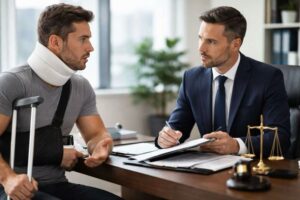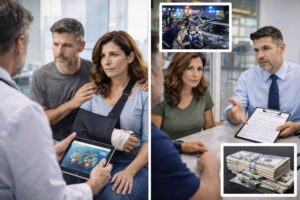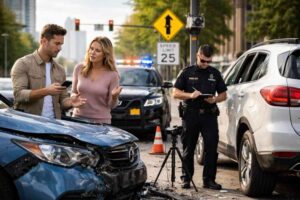Pedestrian accidents can be the driver’s fault, the pedestrian’s fault, or a mix of both. Comparative fault in pedestrian accidents is the court’s way of making compensation fair.
When a person is enjoying a walk in a residential neighborhood and gets hit and injured by a moving vehicle, some portion of fault will almost always be apportioned to the car. After all, human being are no match for even the lightest of vehicles. That is why pedestrian traffic regulations exist: to protect people from motor vehicles, as these machines are controlled by people, drivers should be at fault instead of helpless pedestrians, right? In Florida, cars are considered a DANGEROUS INSTRUMENTALITY. Florida’s dangerous instrumentality doctrine is a common law doctrine which provides that the owner of an inherently dangerous tool, such as car, is liable for any injuries caused by that tool’s operation.
 Drivers of motor vehicles have a responsibility and obligation to always watch the road. Even if a pedestrian crosses a highway, or a road where there is no crosswalk, a driver must be paying attention to the road and try to avoid hitting the pedestrian. If a pedestrian is struck by a car, and the police officer cites the pedestrian, a claim can still be made.
Drivers of motor vehicles have a responsibility and obligation to always watch the road. Even if a pedestrian crosses a highway, or a road where there is no crosswalk, a driver must be paying attention to the road and try to avoid hitting the pedestrian. If a pedestrian is struck by a car, and the police officer cites the pedestrian, a claim can still be made.
Comparative Fault
That is why Florida has comparative fault laws that allow for fault to be determined in proportionate amounts to reality. The reality is many times multiple parties are at-fault on some level for the same accident. In a pedestrian vs. motor vehicle accident, it is generally speaking the driver’s fault. In a civil case, damages will be awarded according to the appropriate level of negligence assigned to the driver.
Compensatory Damages
In civil cases, monetary awards for damages are called compensatory damages. This is compensation for medical care, loss of income, damaged property, pain and suffering, and emotional distress. Plaintiffs can also receive compensation for loss of enjoyment of day-to-day activities, such as an inability to engage in recreational activities or hobbies.
Lastly, compensatory damages can be awarded for loss of consortium, or problems that occurred because of an accident. These awards are an attempt to make the person who was injured whole again. There are sometimes no ways to literally make people whole again, so the courts try to put a price on the things that were lost through the injuries.
Punitive Damages
Florida state law does allow for punitive damages in personal injury cases. This is not for the purpose of making the injured person whole, but instead for the purpose of punishing the person who was at-fault. It is a deterrent from repeating the act again, as it “injures the injurer” further than justified compensatory damages can. These damages are awarded when a defendant is extremely careless or when egregious action caused the injuries. Generally speaking, a court will not adjust punitive damages based on comparative fault because it has nothing to do with fault and more to do with intent. If a person jaywalks, but is hit by a drunk driver, a judge may lower compensatory damages due to comparative fault. The judge is unlikely to change the punitive damages.
Understanding Regulation
Comparative fault, compensatory damages, and punitive damages are relevant to a personal injury case. They don’t help prevent fault and risk in the case of pedestrians walking around Miami. Florida Statute 316.130 is designed to describe behaviors that are best practices for those on foot and in a vehicle.
 Rules for Pedestrians
Rules for Pedestrians
- Obey traffic controls unless directed by an officer.
- No walking on the street when there is a sidewalk available (unless circumstances demand it).
- When there is no sidewalk, pedestrians should walk on the shoulder on the left side of the road. This is relative to the direction they are going (walk toward oncoming traffic for safety).
- No standing on the road for solicitation (no hitchhiking from the roadside).
- Do not leave the curb and run into the path of a vehicle in a way that they cannot possibly stop.
- If crossing where there is no crosswalk, yield the right-of-way to vehicles on the road.
- When crossing the street, go straight across, or take the shortest route to the other side of the street.
- Walk on the right half of crosswalks when possible.
Rules for Drivers
- Stop at intersections before entering a crosswalk and allow pedestrians to cross when present. Do not resume driving until the pedestrian is halfway across the crosswalk.
- Stop at crosswalks that are not in intersections when pedestrians are present, and do not resume driving until they are safely halfway across the street.
- Do not pass drivers who are stopped at a crosswalk.
- Do everything possible to avoid collisions with pedestrians and those using human-powered vehicles.
People may view these rules as obvious, but legislators created these laws to guide people about safely using the streets as pedestrians and drivers. Attorneys use these laws to prove fault or levels of fault in comparative fault personal injury cases.
 Miami Pedestrians
Miami Pedestrians
In 2017, the Miami-Fort Lauderdale area ranked 11th in the nation for pedestrian deaths. Miami-Dade County has adopted a Complete Streets Design Guidelines and a Local Action Plan for Safer People, Safer Streets in order to address the safety of their streets for all users. Hopefully, these initiatives will make a big difference in improving the design of streets for everyone, but accidents will still occur.
Seeking Compensation
The court will award you compensation for your pedestrian injuries if the driver caused the accident. Things you can do to increase your chances of a successful lawsuit are to take photos immediately of any injuries and any evidence you can. Collect the names and contact information of any witnesses. If it is possible, this will help you and your attorney to make sure there is as much evidence as possible to support your claim. Additionally, get medical treatment. This not only helps your case, but may be hugely important for your treatment. It is possible that your injuries are more serious than you know. Only a doctor can rule out any need for additional medical care.
Lastly, don’t undervalue your injuries. You may experience pain and suffering from being hit by a vehicle that is physical and mental. Your recovery can stress your finances, your life enjoyment, your relationship, and your ability. Some of these effects may be long-term. Financial compensation is the closest thing the courts have at their disposal to making you whole again. Limiting your claimed injuries based on some sense of frugality or guilt does not allow you the compensation you deserve for being harmed. You will be awarded damages that are proportionate to your fault and the injuries you suffered during the accident.
Finding Representation
It can seem like a daunting task to find an attorney who will represent you well. You want someone who is knowledgeable, available, and who cares about the end results of your case. Talking to your attorney in-person is important in order to feel like a valued client. Being able to reach him during the weeks or months of your case is crucial to alleviating stress about the outcome.
If you would like a no-obligation consultation with an attorney, please contact Kirschner, Groff & Diaz. You’ll get to speak firsthand with an attorney who cares about getting you fair compensation for your injuries and one who prides himself in being available for each of his clients.



